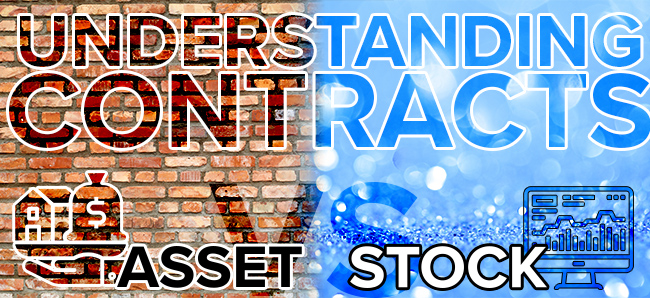So, you’re looking at purchasing someone’s business or selling your business, but what exactly does that mean? You have two primary options: an asset purchase or a stock purchase. It’s very important you understand the differences in order to know which one is best in your situation.
What’s the difference?
With an asset purchase agreement, you are purchasing/selling all of the assets, including equipment, inventory, vehicles, goodwill, customer lists, etc. This requires the purchaser to form a new business entity, and then transfer all of the assets to that new entity. The selling entity can then dissolve and wrap up as the seller desires.
A stock purchase may require more diligence
An asset purchase agreement offers more flexibility between the buyer and seller as compared to the stock purchase, as you get to choose which assets you being purchased, and which liabilities are being assumed. This is especially important for unknown liabilities that may arise that the purchaser probably does not want to be responsible for. If you are doing a stock purchase, the purchaser needs to perform a lot of diligence when insuring there are no hidden liabilities that they may be responsible for in the future, while with the asset purchase, the purchaser can specifically state which, if any, liabilities they are assuming.
A seller's contracts should be a big concern when deciding between an asset transfer or stock purchase
A seller's contracts should be a big concern when deciding between an asset transfer or stock purchase. Typically with a stock transfer, any contracts between the seller and third-parties would not be affected as that would probably not be a triggering assignment, but with an asset transfer, all third-party contracts would have to re-signed, and the terms may not be as favorable as they once were when the seller entered into them.
If the seller has employees, that is another consideration. With an asset purchase you would have to essentially re-hire these employees if you wish to continue their employment with your new entity. This could include renegotiating their contracts, which may not be beneficial.
[Read: Spotlight on Buying or Selling a Business]
After an asset transfer, certain assets may need to be re-titled to ensure they are properly owned by the purchaser. And the seller needs to liquidate any remaining assets that were not sold to the purchaser, or otherwise dispose of them as the case may be. Those potential concerns are not present when performing a stock purchase.
If you're looking at doing a stock purchase, both the seller and purchaser need to be aware of any securities laws that they could potentially be running afoul of. This could especially be triggered when the seller has a large number of shareholders.
Consider the tax implications before deciding

The final huge consideration that both the seller and purchaser need to consider are the tax implications of either the asset purchase or stock transfer. When looking at taxes, as a general rule, stock transfers are typically more beneficial for sellers, and asset transfers are typically more beneficial for purchasers. Of course, that is a very general statement, and looking at the tax implications for both the purchaser and seller need to be analyzed by speaking with a tax professional.
There is no bright-line rule as to whether you should do an asset or stock purchase. There are many variables that need to be considered and analyzed to determine what will work best in your situation, and both the purchaser and the seller need to speak with their own attorneys to determine the best arrangement for them.
Contact or Call us at 505.715.5700 to set up a consultation today.

